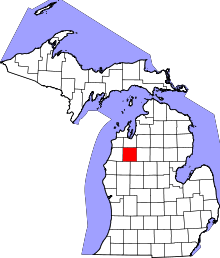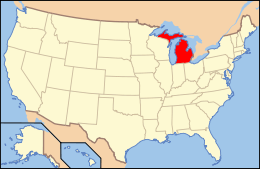Wexford County, Michigan
| Wexford County, Michigan | ||
|---|---|---|
| ||
 Location in the U.S. state of Michigan | ||
 Michigan's location in the U.S. | ||
| Founded |
1840 (created) 1869 (organized)[1][2] | |
| Named for | County Wexford | |
| Seat | Cadillac | |
| Largest city | Cadillac | |
| Area | ||
| • Total | 575 sq mi (1,489 km2) | |
| • Land | 565 sq mi (1,463 km2) | |
| • Water | 10 sq mi (26 km2), 1.8% | |
| Population | ||
| • (2010) | 32,735 | |
| • Density | 58/sq mi (22/km²) | |
| Congressional district | 4th | |
| Time zone | Eastern: UTC-5/-4 | |
| Website |
www | |
Wexford County is a county located in the U.S. state of Michigan. As of the 2010 census, the population was 32,735.[3] The county seat is Cadillac.[4]
Wexford County is part of the Cadillac, MI Micropolitan Statistical Area, which also includes Missaukee County. It is considered to be part of Northern Michigan.
The county is also known for being the location of the first known sighting of the Michigan dogman.
History

The county was established by the Michigan Legislature in 1840 as Kautawaubet County,[5] after a Potawatomi phrase meaning "broken tooth" and the name of an area Potawatomi chief. In 1843, legislators renamed the county Wexford,[5] after County Wexford in Ireland.[1] It was formally organized in 1869.[1]
Geography
According to the U.S. Census Bureau, the county has a total area of 575 square miles (1,490 km2), of which 565 square miles (1,460 km2) is land and 10 square miles (26 km2) (1.8%) is water.[6]
Major highways
Adjacent counties
- Grand Traverse County - north
- Kalkaska County - northeast
- Missaukee County - east
- Osceola County - southeast
- Lake County - southwest
- Manistee County - west
- Benzie County - northwest
National protected area
- Manistee National Forest (part)
Demographics
| Historical population | |||
|---|---|---|---|
| Census | Pop. | %± | |
| 1870 | 650 | — | |
| 1880 | 6,815 | 948.5% | |
| 1890 | 11,278 | 65.5% | |
| 1900 | 16,845 | 49.4% | |
| 1910 | 20,769 | 23.3% | |
| 1920 | 18,207 | −12.3% | |
| 1930 | 16,827 | −7.6% | |
| 1940 | 17,976 | 6.8% | |
| 1950 | 18,628 | 3.6% | |
| 1960 | 18,466 | −0.9% | |
| 1970 | 19,717 | 6.8% | |
| 1980 | 25,102 | 27.3% | |
| 1990 | 26,360 | 5.0% | |
| 2000 | 30,484 | 15.6% | |
| 2010 | 32,735 | 7.4% | |
| Est. 2015 | 33,003 | [7] | 0.8% |
| U.S. Decennial Census[8] 1790-1960[9] 1900-1990[10] 1990-2000[11] 2010-2013[3] | |||
As of the census[12] of 2000, there were 30,484 people, 11,824 households, and 8,383 families residing in the county. The population density was 54 people per square mile (21/km²). There were 14,872 housing units at an average density of 26 per square mile (10/km²). The racial makeup of the county was 97.29% White, 0.19% Black or African American, 0.74% Native American, 0.42% Asian, 0.03% Pacific Islander, 0.24% from other races, and 1.09% from two or more races. 1.01% of the population were Hispanic or Latino of any race. 21.4% were of German, 11.3% English, 9.5% American, 9.4% Irish, 6.1% Dutch, 5.8% Swedish and 5.3% Polish ancestry according to Census 2000. 97.7% spoke English and 1.1% Spanish as their first language.
There were 11,824 households out of which 33.60% had children under the age of 18 living with them, 56.20% were married couples living together, 10.30% had a female householder with no husband present, and 29.10% were non-families. 24.20% of all households were made up of individuals and 10.10% had someone living alone who was 65 years of age or older. The average household size was 2.55 and the average family size was 3.00.
In the county the population was spread out with 26.80% under the age of 18, 7.70% from 18 to 24, 28.10% from 25 to 44, 23.40% from 45 to 64, and 14.00% who were 65 years of age or older. The median age was 37 years. For every 100 females there were 98.10 males. For every 100 females age 18 and over, there were 93.80 males.
The median income for a household in the county was $35,363, and the median income for a family was $39,915. Males had a median income of $31,198 versus $21,733 for females. The per capita income for the county was $17,144. About 7.70% of families and 10.30% of the population were below the poverty line, including 11.50% of those under age 18 and 8.50% of those age 65 or over.
Government
The county government operates the jail, maintains rural roads, operates the major local courts, keeps files of deeds and mortgages, maintains vital records, administers public health regulations, and participates with the state in the provision of welfare and other social services. The county board of commissioners controls the budget but has only limited authority to make laws or ordinances. In Michigan, most local government functions — police and fire, building and zoning, tax assessment, street maintenance, etc. — are the responsibility of individual cities and townships.
Elected officials
- Prosecuting Attorney: Anthony Badovinac
- Sheriff: Gary A. Finstrom
- County Clerk: Elaine L. Richardson
- County Treasurer: Jayne E. Stanton
- Register of Deeds: Lorie Sorensen
- Drain Commissioner: Michael Solomon
- County Surveyor: Richard Wilcox
(information as of September 2005)
Politics
The county is one of the few counties to have given majorities to both the first Republican candidate, John C. Frémont,[13] and to John McCain.[14] That stated, the county went for Bill Clinton twice.[15]
Tourism
There are many attractions and hot spots in Wexford County. The Manistee National Forest is one recreation site. The Manistee River is used by fishermen, kayakers, and canoers.
Communities
Cities
Villages
- Buckley (partially in Grand Traverse County)
- Harrietta
- Mesick
Unincorporated communities
Townships
- Antioch Township
- Boon Township
- Cedar Creek Township
- Cherry Grove Township
- Clam Lake Township
- Cleon Township
- Colfax Township
- Greenwood Township
- Hanover Township
- Haring Township
- Henderson Township
- Liberty Township
- Selma Township
- Slagle Township
- South Branch Township
- Springville Township
- Wexford Township
Historical markers
There are ten recognized Michigan historical markers in the county:[16] They are:
- Battle of Manton
- Caberfae Ski Resort
- Cadillac Carnegie Library
- Charles T. Mitchell House
- Clam Lake Canal
- Cobbs & Mitchell Building
- Cobbs and Mitchell Mill No.1
- First Wexford County Courthouse
- Greenwood Disciples of Christ Church
- Shay Locomotive
See also
- List of Michigan State Historic Sites in Wexford County, Michigan
- National Register of Historic Places listings in Wexford County, Michigan
References
- 1 2 3 "Bibliography on Wexford County". Clarke Historical Library, Central Michigan University. Retrieved January 23, 2013.
- ↑ Cadillact History Archived February 29, 2012, at the Wayback Machine.
- 1 2 "State & County QuickFacts". United States Census Bureau. Retrieved August 29, 2013.
- ↑ "Find a County". National Association of Counties. Retrieved 2011-06-07.
- 1 2 3 Newberry Library. "Michigan: Individual County Chronologies". Atlas of County Historical Boundaries. Retrieved 2016-11-04.
- ↑ "2010 Census Gazetteer Files". United States Census Bureau. August 22, 2012. Retrieved September 28, 2014.
- ↑ "County Totals Dataset: Population, Population Change and Estimated Components of Population Change: April 1, 2010 to July 1, 2015". Retrieved July 2, 2016.
- ↑ "U.S. Decennial Census". United States Census Bureau. Retrieved September 28, 2014.
- ↑ "Historical Census Browser". University of Virginia Library. Retrieved September 28, 2014.
- ↑ "Population of Counties by Decennial Census: 1900 to 1990". United States Census Bureau. Retrieved September 28, 2014.
- ↑ "Census 2000 PHC-T-4. Ranking Tables for Counties: 1990 and 2000" (PDF). United States Census Bureau. Retrieved September 28, 2014.
- ↑ "American FactFinder". United States Census Bureau. Retrieved 2008-01-31.
- ↑ "1856 Presidential Election Statistics". uselectionatlas.org.
- ↑ "Dave Leip's Atlas of U.S. Presidential Elections - State Data". uselectionatlas.org.
- ↑ The New York Times electoral map, 2008 (Zoom in on Michigan)
- ↑ "Michigan Historical Markers". michmarkers.com.
Further reading
- "Bibliography on Wexford County". Clarke Historical Library, Central Michigan University. Retrieved January 23, 2013.
External links
- Wexford County
- Wexford County Fact Book
- Chapter XVII Wexford County in A history of northern Michigan and its people by Perry F. Powers ; assisted by H.G. Cutler. Powers, Perry Francis, 1857-1945. Chicago: Lewis Publishing Co., 1912. p. 404
- History of Wexford County, Michigan, comp. by John H. Wheeler, Logansport, Ind.:B. F. Bowen, 1903.
 |
Benzie County | Grand Traverse County | Kalkaska County |  |
| Manistee County | |
Missaukee County | ||
| ||||
| | ||||
| Lake County | Osceola County |
Coordinates: 44°20′N 85°35′W / 44.34°N 85.58°W